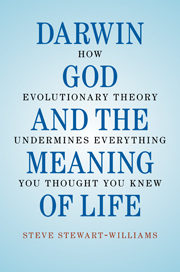 Darwin, God and the Meaning of Life
Darwin, God and the Meaning of Life Book contents
- Frontmatter
- Contents
- Acknowledgments
- 1 Darwin and the big questions
- Part I Darwin gets religion
- 2 Clash of the Titans
- 3 Design after Darwin
- 4 Darwin's God
- 5 God as gap filler
- 6 Darwin and the problem of evil
- 7 Wrapping up religion
- Part II Life after Darwin
- Part III Morality stripped of superstition
- Suggestions for further reading
- References
- Index
3 - Design after Darwin
Published online by Cambridge University Press: 05 June 2012
- Frontmatter
- Contents
- Acknowledgments
- 1 Darwin and the big questions
- Part I Darwin gets religion
- 2 Clash of the Titans
- 3 Design after Darwin
- 4 Darwin's God
- 5 God as gap filler
- 6 Darwin and the problem of evil
- 7 Wrapping up religion
- Part II Life after Darwin
- Part III Morality stripped of superstition
- Suggestions for further reading
- References
- Index
Summary
The heavens declare the glory of God; and the firmament sheweth his handywork.
Psalms 19:1For the invisible things of him from the creation of the world are clearly seen, being understood by the things that are made, even his eternal power and Godhead.
Romans 1:20Natural selection enabled one to see, almost as in a conversion experience, how nature could counterfeit design … it can be a profound existential experience when one first sees the world not as Paley saw it but through the eyes of Darwin.
John Brooke (2003), pp. 195–6God the builder
Over the ages, many reasons have been put forward for believing in God, but two have been particularly popular and persuasive with a Christian audience. The first is an appeal to the authority of the Bible; we dealt with this in Chapter 2. The second and more sophisticated reason is the argument from design. Stripped to its barest bones, the argument is as follows: certain parts of the world look as though they were designed; design implies a designer; and that designer is God. In this chapter, we'll explore the design argument and its history, and then look at how Darwin's theory rewrites the very terms of the debate.
The argument from design
The argument from design (also known as the teleological argument) is one of the most admired and intuitively plausible arguments for the existence of God.
- Type
- Chapter
- Information
- Darwin, God and the Meaning of LifeHow Evolutionary Theory Undermines Everything You Thought You Knew, pp. 45 - 53Publisher: Cambridge University PressPrint publication year: 2010


